
Franco Corelli - Songs & Arias
Franco Corelli, who sang from 1951 to 1975, was the greatest tenore di forza of the postwar era. A powerful and exciting singer, never a subtle, elegant, or refined one, he had his detractors (who called him crude, vulgar, self-indulgent, and who lambasted his execrable French), but there can be no argument about the quality of his voice, a big, vibrant tenor with a thrilling timbre (often described as rich, dark, or baritonal) and a brilliant, secure top that must have been the envy and despair of other tenors. A nervous performer repeatedly subject to pre-performance jitters and anxiety attacks (a wag once said of him that Corelli could always think of more reasons not to sing than to sing), once onstage he was a generous singer who gave fully of himself and, like Caruso, poured out his magnificent voice unstintingly, never holding back. The voice itself was one of the glories of the generously-endowed operatic scene of the Fifties and Sixties, and one of greatest tenor voices of the century. Herbert von Karajan said of Corelli, "A voice of heroic power, yet with great beauty of tone; darkly sensuous, mysteriously melancholic . . . but above all, a voice of thunder and lightning, fire and blood." Harold C. Schonberg, senior music of the New York Times, reviewing Corelli's Metropolitan debut in 1961, noted that his voice "has something of an exciting animal drive about it, and when Mr. Corelli lets loose, he can dominate an ensemble," and later described his voice as "a force of nature, an act of God, the vocal equivalent of an earthquake, volcano or hurricane." The distinguished musicologist Paul Henry Lang writing in the New York Herald-Tribune called Corelli "a latter-day Caruso." Alan Rich of the New York Herald-Tribune wrote of him, "There is no tenor in modern times, Italian or otherwise, whose voice rings out with greater vibrancy, whose every tone carries with it emotion at white heat. The sounds he makes, seemingly without effort, are dazzlingly bright, urgent, and communicative." Since Corelli's retirement we haven't heard anything remotely like him, and those of us who know his voice (and Bjorling's) can perhaps be pardoned for finding the "three tenors" so popular today somewhat anemic in comparison. I have been an admirer of Corelli, a collector of his recordings, and a follower of his career since the late 1950s (when he had not yet sung in America, and his only recordings were Italian Cetra imports). I have just about everything he recorded. There is no tenor voice before the public today equal to this one, and I urge you not to miss it. But the two-CD set under review here is not the place to start. If you are new to Corelli, I recommend the EMI single CD "Heroes" or the EMI two-CD set "Franco Corelli," with their heavy doses of his typical operatic fare, as ideal introductions to this rewarding singer. Corelli was above all a creature of the opera house, in his element singing Puccini, Verdi, and verismo Italian opera. The set under review here, misleadingly entitled "Songs and Arias," contains in fact only one aria, a very atypical one: Handel's "Ombra mai fu" from "Serse" (made famous by a Caruso recording). Indeed, some of the composers represented here-Handel, Schubert, Bach, Mozart, Rossini-are in fact stylistically very far from the kind of singing one associates with Corelli. A couple of the songs, "Because" and Grieg's "I Love Thee," are mildly comical in Corelli's overpoweringly Italianate and operatic renditions. But this is a set well worth owning for anyone who knows and likes Corelli. There is a first-rate Ingemisco from the Verdi Requiem, the traditional religious songs are all sung with seriousness and devotion, and most important, the bulk of the set comprises Neopolitan songs, which Corelli sings superbly. (I think he sings them better than anyone.) Of these my own favorite is "Core n'grato," a powerful song, and Corelli's recording of it is unequalled: there is a prodigious outpouring of bronzen tone here that must be heard to be believed. It's true that some of the orchestral arrangements are corny and dated, but with gloriously gutsy, full-blooded singing like this, from one of the greatest tenor voices of the century in its prime (all the recordings here are from 1961 to 1965), I can overlook the arrangements. These two CDs are very generously filled (22 songs,77 minutes for one and 23 songs, 78 minutes for the other), and include, I believe, everything Corelli recorded for EMI that wasn't opera. If you like Corelli, if you like Neopolitan songs, you'll want this. But it's not the place to start in appreciating Franco Corelli.
